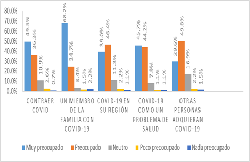Perception and risk of COVID-19 in Perú
DOI:
https://doi.org/10.51252/rsayb.v2i1.514Keywords:
control, online survey, pandemic, preventionAbstract
The objective of this work was to evaluate, at the perceptual level, those aspects that condition individual and/or collective behaviors, in order to improve the prevention and control strategies of COVID-19. A cross-sectional study was conducted using an online survey. In the first part of the questionnaire, the sociodemographic information of the respondents was collected, including age, sex, and type of study. In the next part of the survey, the perception towards COVID-19 was evaluated as the way to prevent the disease, the perceived risk of contracting certain diseases, and the credibility of the information related to COVID-19. The data can be found on FIGSHARE. The age of the respondents was in an age range between 15-69 years, the majority being women 158 (59.3%) compared to 109 (40.7%). Respondents were asked how worried they would be if they contracted COVID-19132 (49.5%) responded that they would be very worried, 97 (36.3%) were worried, 29 (10.9%) were neutral, 7 (2.6%) were little concerned and 2 (0.7%) not at all concerned. In conclusion, our study shows that the majority of respondents are aware of the COVID-19 disease and of preventive measures.
Downloads
References
Reuben RC, Danladi MMA, Saleh DA, Ejembi PE. Knowledge, Attitudes and Practices Towards COVID-19: An Epidemiological Survey in North-Central Nigeria. Journal of Community Health [Internet]. 2021;46(3):457-70. Disponible en: https://link.springer.com/10.1007/s10900-020-00881-1
Zhong B-L, Luo W, Li H-M, Zhang Q-Q, Liu X-G, Li W-T, et al. Knowledge, attitudes, and practices towards COVID-19 among Chinese residents during the rapid rise period of the COVID-19 outbreak: a quick online cross-sectional survey. International Journal of Biological Sciences [Internet]. 2020;16(10):1745-52. Disponible en: http://www.ijbs.com/v16p1745.htm
Wu F, Zhao S, Yu B, Chen Y-M, Wang W, Song Z-G, et al. A new coronavirus associated with human respiratory disease in China. Nature [Internet].2020;579(7798):265-9. Disponible en: http://www.nature.com/articles/s41586-020-2008-3
Chen N, Zhou M, Dong X, Qu J, Gong F, Han Y, et al. Epidemiological and clinical characteristics of 99 cases of 2019 novel coronavirus pneumonia in Wuhan, China: a descriptive study. The Lancet [Internet]. 2020;395(10223):507-13. Disponible en: https://linkinghub.elsevier.com/retrieve/pii/S0140673620302117
WHO. Co V I D ‑ 19 Strategy Up Date [Internet]. Vol. 3. World Health Organization; 2020. Disponible en: https://www.who.int/docs/default-source/coronaviruse/covid-strategy-update-14april2020.pdf?sfvrsn=29da3ba0_19
Al-Hanawi MK, Angawi K, Alshareef N, Qattan AMN, Helmy HZ, Abudawood Y, et al. Knowledge, Attitude and Practice Toward COVID-19 Among the Public in the Kingdom of Saudi Arabia: A Cross-Sectional Study. Frontiers in Public Health [Internet]. 2020;8. Disponible en: https://www.frontiersin.org/article/10.3389/fpubh.2020.00217/full
Iglesias-Osores S. DATASET Percepción y riesgo de COVID-19. Conjunto de datos [Internet]. 2021; Disponible en: https://figshare.com/articles/dataset/DATASET_Percepci_n_y_riesgo_de_COVID-19/14215508
Lau LL, Hung N, Go DJ, Ferma J, Choi M, Dodd W, et al. Knowledge, attitudes and practices of COVID-19 among income-poor households in the Philippines: A cross-sectional study. Journal of Global Health [Internet].2020;10(1). Disponible en: http://jogh.org/documents/issue202001/jogh-10-011007.pdf

Published
How to Cite
Issue
Section
License
Copyright (c) 2023 Johana Acosta-Quiroz, Sebastian Iglesias-Osores

This work is licensed under a Creative Commons Attribution 4.0 International License.
The authors retain their rights:
a. The authors retain their trademark and patent rights, as well as any process or procedure described in the article.
b. The authors retain the right to share, copy, distribute, execute and publicly communicate the article published in the Revista Salud Amazónica y Bienestar (RSAYB) (for example, place it in an institutional repository or publish it in a book), with an acknowledgment of its initial publication in the RSAYB.
c. Authors retain the right to make a subsequent publication of their work, to use the article or any part of it (for example: a compilation of their works, notes for conferences, thesis, or for a book), provided that they indicate the source of publication (authors of the work, journal, volume, number and date).



